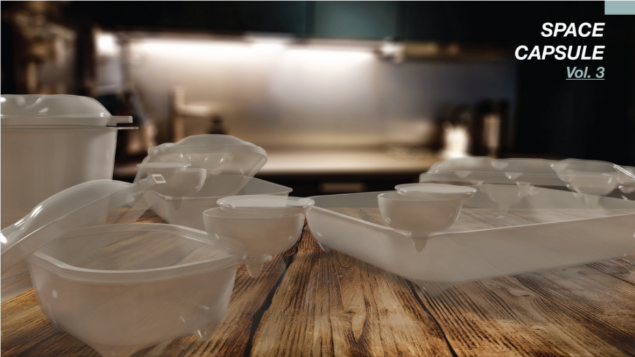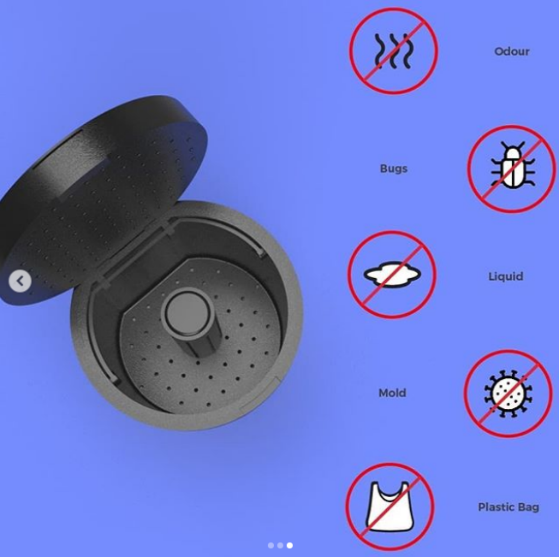
The Space Capsule, by OCAD University Industrial Design graduate Curtis Kwok, is biodegradable food packaging that dissolves in the dishwasher
Among the next generation of industrial designers are two new OCAD University graduates who have creative and credible ideas for a greener future.
Curtis Kwok and Orville Seo recently completed OCAD U’s Industrial Design undergraduate degree program, and both chose to focus their major design project on reducing food-related waste. Following their program’s emphasis on conducting extensive research to develop a well-thought-out concept, the two developed practical solutions to, respectively, make food takeout packaging biodegradable, and minimize organic household waste.
Eco-friendly food delivery
For Kwok, it was his own regular use of food delivery services that got him thinking critically about single-use takeout packaging that doesn’t biodegrade—an issue that has been exacerbated by the rise of food-delivery services and, more recently, the increase in use of these services during the pandemic.
The answer to this problem, says Kwok, can be found in an unlikely place: crustaceans such as lobsters and crabs. Their exoskeletons contain a substance called chitin that when treated, becomes a biopolymer called chitosan. As Kwok discovered through his research, packaging made out of this renewable organic substance can dissolve in water.
Kwok’s resulting invention is the Space Capsule: stackable, portable takeout containers made of biodegradable chitosan. The built-in handle means no plastic bag is required to carry the containers, which further reduces waste. When the packaging is put in a dishwasher cycle, it dissolves.
“A product like this could help alleviate the current urgent situation of disposable packaging,” Kwok says. “Jules Goss, our main professor, pushed me to take the risk and feel confident about my concept when it sounded vague—I’m deeply grateful.”
Drying out organic waste
For Orville Seo, the priority was addressing the number one source of food waste: leftover or spoiled household food tossed in the garbage. He found that 47 per cent of food waste in Canada occurs at home. As well, land-
filled organic matter creates methane gas, which is 25 times more damaging to the environment than carbon dioxide. In Toronto and many other jurisdictions, we keep organics out of the landfill by processing them into compost. But, thought Seo, if we can drain the liquids from our organic waste, it will reduce the overall volume.
Seo’s solution is the Organic Dehydrator, a bin that uses charcoal and silica gel to absorb moisture emitted by food waste during the decaying process. This approach, he found, could reduce a household’s portion of food waste by 30 to 50 per cent. Seo’s innovation has other benefits: it eliminates the unpleasant odours, mould and insects associated with rotting food, and it doesn’t require a power source to operate.
“Food waste is a major environmental issue… and there is very little on the market that is simple to use, affordable and doesn’t require power,” says Seo, who is now exploring patenting and manufacturing his invention. “This is one way to reduce organic waste by a significant amount.”
The Organic Dehydrator, by OCAD U Industrial Design student Orville Seo, can help significantly reduce household food waste
